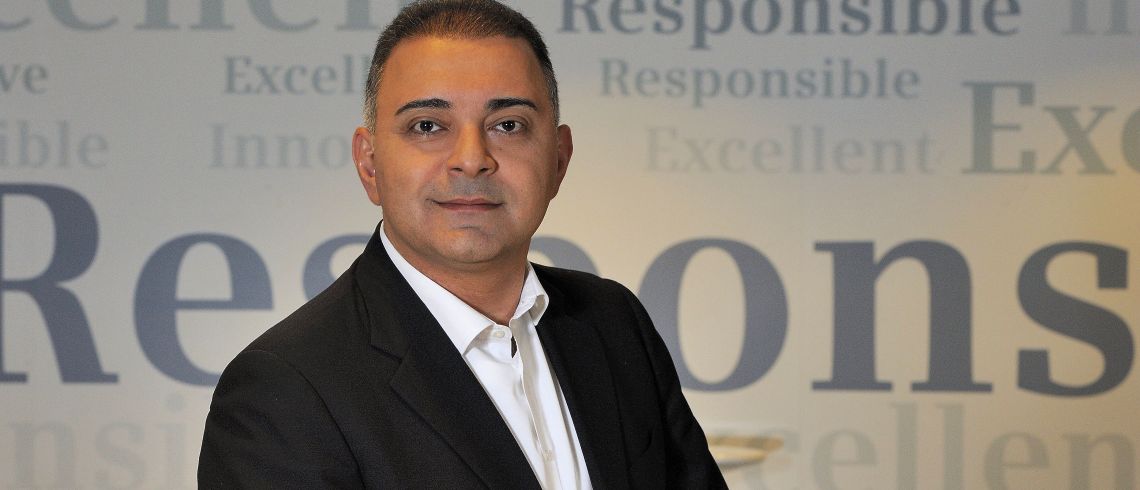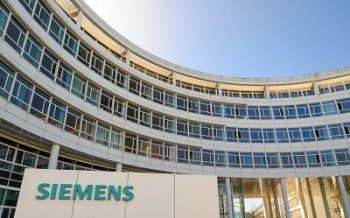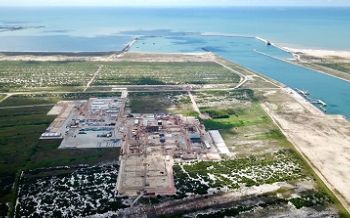At a time when a billion people lack access to power and the world is seeing record levels of atmospheric CO2 emissions, engineering technology giant Siemens says it is working to position itself as an active player in the energy transition, with natural gas, LNG and renewables at the core of its strategy moving forward.
“The world desperately needs clean energy. But what do we do?” asks Arja Talakar, who was appointed CEO of Siemens Oil & Gas Business Unit earlier this year, having previously held the top job at Siemens Saudi Arabia. “Our stance on the matter? We’re not just an energy company. We’re an energy transition company.”
Talakar is starting out in his new role just as Siemens gears up to launch an independent entity that will combine its oil and gas, power generation, power transmission, and related service businesses. The new company will also have a “tremendous focus” on renewables, Talakar tells LNG Business Review, as it will receive Siemens’ 59% stake in Siemens Gamesa Renewables (SGRE).
“By corporate standards, Siemens has a long history. It also has a track record of evolving to remain innovative. In one sense, we never grow old. As a technology provider, we cannot afford to.”
The new company will be “ideally suited” to drive a “smarter” energy transition, from optimising resources to reducing emissions, Talakar says, stressing that gas- and LNG-to-power will remain a major focus for it, especially considering that Siemens has significantly expanded its scope within LNG in recent years.
I see hydrogen-powered turbines playing a role in reducing LNG plant emissions.
“We have acted as a supplier to LNG operators for decades, through Siemens and Dresser-Rand,” he says, pointing out that his company is now one of only a handful that span the entire LNG project lifecycle, from Front End Engineering Design (FEED) and project management and execution, to financing, rotating equipment and digital solution services that aim to maximise uptime.
“In addition, we offer the best-in-class technologies for turbomachinery, automation and electrification solutions to maximise reliability.”
Talakar believes that fossil fuels and renewables will each comprise roughly half of the global energy mix by 2050, with gas and LNG playing an “integral” role in the energy mix of the future, continuing to act as bridge fuels that help reduce emissions in the near- and mid-term.
We want to be a partner in the energy transition that is happening around the world,” he says. “LNG is basically going to be the fuel that enables the transition to what could turn out to be other dominant fuels in the future, such as hydrogen.”
Plug-and-play
But what about the current state of play in LNG? For Talakar, while there are “completely valid reasons” behind the LNG industry’s notoriously long project development cycles, maximising efficiency should be every market participant’s number one priority.
“The question on everyone’s mind, including ours, is: How do we move the needle? The drivers go beyond business and the need to turn a profit. LNG plants and natural gas in general are also levers for economic development and emissions reductions.”
With 2020 just around the corner, Talakar lists modularisation, digital solutions and all-electric LNG plants among the concepts Siemens will be promoting in the next decade in order to help maximise efficiency and reduce emissions.
To begin, he says there are “inherent advantages” to modular design in the LNG industry and offers the example of Siemens’ ‘e-houses’, which are customised, pre-assembled and pre-tested modular power substations.
“Siemens supported a major LNG project in Siberia. We designed and built multiple e-houses offsite – especially at a yard in Indonesia – then installed them onsite in Siberia to enable power generation and distribution.”
Getting energy transition achieved in different parts of the world is a matter of corporate social responsibility.
Talakar says a more conventional approach would have required moving engineers to the remote job location for an extended period of time. However, by employing what he describes as a “plug-and-play” solution, installation time and risk were greatly reduced. He is confident that modular construction techniques will be more widely adopted by the LNG industry going forward.
Digital solutions
Asked to explain how his company’s digital solutions – which Siemens says harness data to enhance asset performance – work in practice for gas and LNG, Talakar responds that Siemens uses machine data to predict and pre-empt the failure of critical equipment, which helps enhance efficiency and safety.
“Artificial intelligence is taking asset optimisation to another level, enabling performance management for whole fleets,” he says, adding that additive manufacturing, or 3D printing, makes it possible for Siemens to create spare parts and components on demand, while so-called “digital twins” enable design, testing and training in virtual, risk-free environments.
“Some have gone as far as saying that data is the new oil!” Talakar says. “Digital is in our DNA and we are at the forefront of all these domains.”
In practice, Talakar says Siemens has applied digital solutions, including asset management and remote monitoring, across the oil and gas industry. In one LNG facility, the company supplied drive trains, as well as a data-based solution to optimise drive performance.
“Our specialised sensors are able to detect minute particles that can cause drives to fail. Our approach to acquiring and analysing the data helps ensure uptime at the facility.”
Talakar is keen to highlight that without assessing the environmental footprint of LNG plants, it will remain hard to hail gas and LNG as a bridge fuel. He illustrates his point with the example of the automotive industry: “The degree to which an electric car truly reduces emissions also hinges on how the power that charges it is produced. Where feasible, electric-powered LNG plants will certainly have a place in the industry of the future. Similarly, although hydrogen as fuel is still very early in its development, I see hydrogen-powered turbines playing a role in reducing LNG plant emissions.”
Opening new markets
Siemens is involved in several gas-to-power projects around the world, most notably the 3 GW Acu project in Brazil. Asked how Siemens can help open up new markets to LNG at a time when the ‘low-hanging fruit’ of demand appears to have been picked, Talakar says the hurdle of securing financing, which at times seems insurmountable, will have to be overcome.
“LNG projects are complex by nature, but LNG-to-power projects all the more so,” he says. “North America is where production has spiked, but it’s the developing world in need of natural gas. Securing financing for a singular LNG plant along the US Gulf Coast has one risk profile. Securing financing for the requisite regasification plant, pipeline and power plant in the receiving country has a higher price tag and greater risk profile, depending on location.”
I believe that strong relationships built on trust will be an important element of the energy transition.
To ease this issue, Siemens itself provides financing and helps clients in securing financing from other sources to help diversify and mitigate the risk, says Talakar. He believes that greater awareness of the problem, allied to better collaboration between stakeholders, will also help open up new markets.
“It’s a matter of corporate social responsibility. How can we get energy transition achieved in different parts of the world, on the ground, with national and regional governments?” he asks. “We also need to see how the economic development of different countries will go under trade wars and geopolitical tension in some areas.”
Workforce of the future
For his new role, Talakar is now based in Houston, but it is clear that the 15 years he spent in Saudi Arabia as head of Siemens in the country, where his daughters were born and raised and his family still regards as home, left an indelible mark on him.
“Saudi culture places a particularly strong emphasis on relationships and trust, an aspect of living there I have thoroughly enjoyed. I believe that strong relationships built on trust will also be an important element of the energy transition,” he says.
Saudi Arabia’s proportionately young population, with more than 50% of its inhabitants below 25 years old, is the main driver behind the changes currently being implemented in the country, Talakar says. But at a time when climate change concerns and greener ideals seem to occupy the minds of a younger generation, which means they may be more hostile towards fossil fuels than previous ones, how does a company like Siemens go about recruiting new talent? Talakar believes that Siemens’ new entity will appeal to this younger generation thanks to its focus on energy transition.
“When I graduated from university, I worked for two years in the field of solar aeroplanes, which could carry a pilot and have self-started capability,” he says. “I decided to leave that industry and move to oil and gas because I found it very appealing to contribute to driving up this segment’s efficiency and making it cleaner. I’m sure that many people find this appealing too.”
Above all, Siemens is keen to continue exhibiting its natural propensity to evolve with the times, Talakar says, which in itself should be a draw to new recruits.
“Energy has been part of Siemens’ legacy for over 170 years. We will continue to focus on making fossil fuels cleaner and renewables more cost-competitive and develop solutions to meet society’s evolving energy needs. Being aware of the reality, that solutions can be practical but also affordable, can lead to a clean energy future,” he concludes. - KT
Subscription Benefits
Our three titles – LNG Business Review, Gas Matters and Gas Matters Today – tackle the biggest questions on global developments and major industry trends through a mixture of news, profiles and analysis.
LNG Business Review
LNG Business Review seeks to discover new truths about today’s LNG industry. It strives to widen market players’ scope of reference by actively engaging with events, offering new perspectives while challenging existing ones, and never shying away from being a platform for debate.
Gas Matters
Gas Matters digs deep into the stories of today, keeping the challenges of tomorrow in its sights. Weekly features and interviews, informed by unrivalled in-house expertise, offer a fresh perspective on events as well as thoughtful, intelligent analysis that dares to challenge the status quo.
Gas Matters Today
Gas Matters Today cuts through the bluster of online news and views to offer trustworthy, informed perspectives on major events shaping the gas and LNG industries. This daily news service provides unparalleled insight by drawing on the collective knowledge of in-house reporters, specialist contributors and extensive archive to go beyond the headlines, making it essential reading for gas industry professionals.





